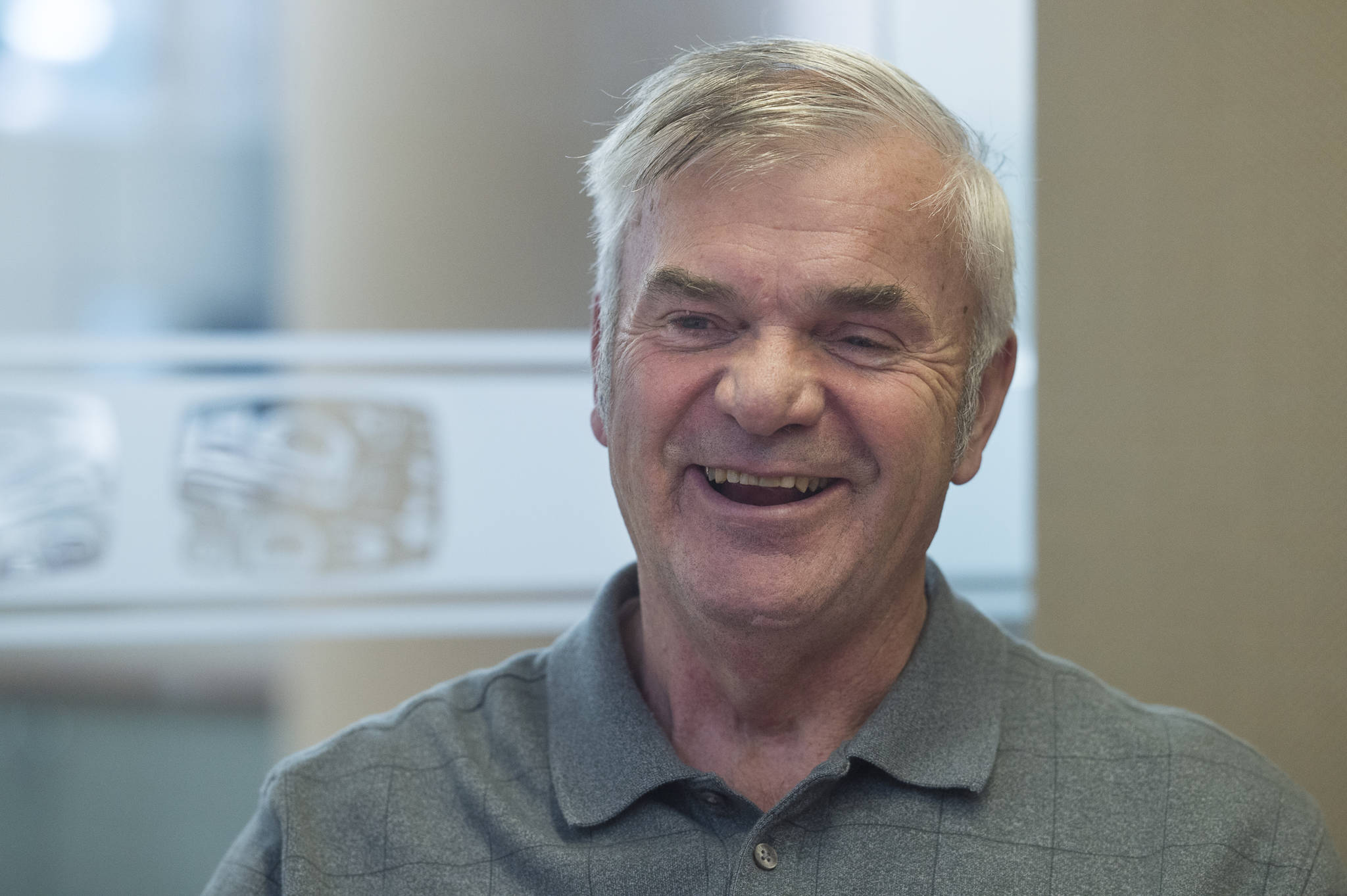Don Etheridge woke up in the middle of the night with a sinking feeling.
He didn’t know what was wrong, but after tossing and turning in bed, he got up, put on his boots and drove to his boat. For years, Etheridge has been working to restore a 110-foot World War II tugboat, and in search of assurance, he went to its spot in the harbor and climbed into the engine room. When he got to the bottom, he splashed into water.
What followed were several days of hard work to restart failed pumps and fix a leaking packing gland.
Etheridge, 66, is running as an independent to represent Senate District Q in the Alaska Legislature. In a Tuesday interview with the Empire, he said he thinks Juneau voters have a similar feeling of unease when they think about the Legislature.
“Most people are tired of the partisan politics,” he said. “They want to see something change in the Legislature.”
Etheridge is a diesel mechanic, laborer and boat captain turned labor lobbyist. Until he chose to run for office in May, he was the Capitol lobbyist for the AFL-CIO. Born in San Diego, he has lived in the capital city since 1959 and is a 1971 graduate of Juneau-Douglas High School who has lived most of his life in the Mendenhall Valley.
He is married to Terasa, and they have three children: Richard, Jennifer and Carl.
Etheridge’s only other foray into public office was in 1999, when he ran for (and won) a seat on the City and Borough of Juneau Assembly. While there, he was a supporter of the Juneau Access road project, renovations to Juneau-Douglas High School, and construction of what became Thunder Mountain High School.
He ran for re-election in 2002 but lost to Stan Ridgeway. Since 2003, he has served on the CBJ’s docks and harbors board.
When he started knocking on doors for his campaign, he said Alaska’s budget issues were his top priority. That has changed.
“I didn’t realize just how bad criminal activity is in some areas,” he said.
Going door to door, he notices the bright new security systems and cameras on homes.
“It’s a little bit depressing,” he said. “I knew we had a problem, but I didn’t realize just how bad it was.”
Public safety now tops his list of priorities, and at forums and elsewhere across the city, he has supported more personnel and equipment for police and fire departments. One of Etheridge’s sons is chief of Capital City Fire/Rescue. One of his daughters is an officer with the Juneau Police Department.
The state’s finances may have been bumped from the top of his list of key issues, but they run a close No. 2. At the end of the legislative session, the state’s deficit was estimated at $700 million, even after the cut to the Permanent Fund Dividend. Higher oil prices may reduce or entirely eliminate that gap, but a reduced dividend is likely to remain, as are shrunken state savings accounts and the prospect of needs unfunded by past cuts.
“The oil price is back up today, but what’s it going to be next month and the month after?” Etheridge asked.
For that reason, Etheridge supports the use of a portion of the Permanent Fund for ordinary services, and he supports an additional tax if necessary.
Etheridge has offered a unique take on the tax proposal, suggesting that if a tax is implemented, Alaskans should be eligible for a tax credit equivalent to the difference between the reduced dividend and the traditional formula. Out-of-state workers would not be eligible for that credit, ensuring they would pay a greater proportion of any proposed tax.
No Republican is running for the District Q seat, and Etheridge’s campaign has garnered support from some Juneau Republicans, including former Rep. Cathy Muñoz, R-Juneau, who hosted a fundraiser for Etheridge.
Etheridge said he is not running as a “shadow Republican” in this year’s election. Rather, he thinks some Republicans see him as “the lesser of the evils” by favoring him instead of Democratic candidate Jesse Kiehl.
In addition, he feels he gained a trustworthy reputation while working as a lobbyist at the capitol.
“The fact that I’m willing to work with and listen to the Republican side — they trust me,” he said. “I refuse to lie to everybody up there, and I won’t mislead people when I talk to them.”
Election Day is Nov. 6. Early voting begins Oct. 22 at the State Office Building and in the Mendenhall Mall Annex.
Election profiles schedule
Ahead of the Nov. 6 general election, the Empire is publishing profiles of the six local candidates who will appear on the ballot. One will run each day. Here’s when you can expect to see a story:
• Oct. 18: Don Etheridge
• Oct. 19: Chris Dimond
• Oct. 21: Jesse Kiehl
• Oct. 22: Jerry Nankervis
• Oct. 23: Andi Story
• Oct. 24: Sara Hannan

